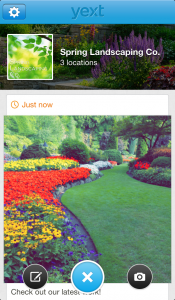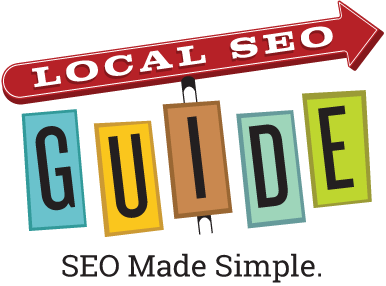Today Yext announced Sync, a service that lets you sync a business’ location data to Facebook along with “enhanced” data such as menus, offers, photos and status updates. While there are plenty of social media management tools that allow you to control content on a Facebook Page, the two big differences with Yext’s service are that it also allows you to share this info across Yext’s Powerlistings network of 50 or so local search sites like Yelp, YP.com, etc. and it attaches the status updates to your business’ location data.
(Disclosure: I do some consulting for Yext so I will try to keep my pro-client bias out of this post)
If you want to know more about how Yext Sync works, you can check out Greg Sterling’s post and here’s a screenshot from Yext’s iPhone app that shows how you can take a photo and share it. It’s kind of like a b2b Instagram:
Besides the utility of the service, perhaps the most interesting thing to me about Sync is that Yext has taken a “Product” that other start-ups are selling (e.g. Facebook Page Management) and turned it into a “Feature” of Yext’s Powerlistings Product. Now Yext will say that they have little interest in supplanting Buddy Media or HootSuite, and in fact, those services offer much more in-depth tools than Sync/Powerlistings for social media management. And I could easily see Yext at some point rolling out an API that allows those services to sync their data up with Yext’s location data (no idea if that’s in the works or not). But to me it raises an interesting question – which is more valuable – social media management or location data management?
Lately to me it seems like social media management has become more commoditized while location data management, which can be hugely complex, has become something of a unique service, which is odd, because if you had asked me a few years ago, I would have said it was the other way around.


8 Response Comments
I struggle to see the usefulness of pushing the same status updates to ~50 sites from a SEO perspective. Isn’t Google & other search engines simply going to note the duplicate content and demote appropriately? My other question would be how rapidly are they able to update across the network. I have heard stories of NAP information taking weeks if not months to translate across the third party data aggregators, are status updates going to move faster?
I hear the “dupe content” concern a lot. The way I see it, 95% of the pages on most local search sites are virtual duplicates with every other site (same NAP for each business). So adding an extra bit of text – be it a status update, an offer, a description, etc, shouldn’t be any more of a dupe issue than the site already has. And in fact, it might help the site carrying the content as Google won’t find it on every site at the same time.
Also when it comes to Sync, I think, actual status updates will only appear on Facebook while the other enhanced data will appear throughout the network (at the business’ option). Need to verify this with Yext.
Re the issue with a lag in getting updated NAP data onto these sites, that’s one of the reasons why Yext exists. They have the ability to update the sites in their network in real time.
I see location data management being called a unique service as more of an opportunity than anything else. As far as duplicate content, I have and still believe it is mostly a non issue, unless it involves copyright violations.
Both valuable and essential from this biased perspective.
Interesting for sure, looking forward to seeing more practical usage examples.
Lots of questions, time will tell.
If we (or they – listing sites/IYPs..etc.) don’t have a standardized set of data to adhere to, how can any service format it correctly for broad syndication?
Some sites have fields for offers/status updates..etc., some don’t.
I’m assuming the Yext product goes above and beyond what Manta or MerchantCircle are doing in that they are going outside the Yext network?
Chris, not sure re the status updates, but Yext has a variety of implementation methods to deal with the issue you are raising. Re Manta/MC, which services are you referring to?
Happy to hear it Andrew, so it’s only Facebook status updates (& offers..etc) that are integrated – maybe I was jumping the gun envisioning an all-knowing local search dashboard of my dreams.
Manual insertion has been the MO here to prevent inconsistencies (yeah right) & ensure business owner control.
Localeze has been the frontrunner for channel partner but maybe Yext is next.
With regards to MC/Manta I was referring to their internal networking functionality – businesses having a blog, newsletter, or post to (some) social capabilities from within their respective profile.
The difference between Yext & Localeze is that Yext is almost instantaneous and allows for a lot more data types than Localeze while Localeze is more of a way to cover a lot of your bases over a longer period of time. The way I think about it is if you are going to be updating your data regularly, Yext is a great option, whereas if you are just looking for a set it and forget it service, Localeze or InfoGroup are good way to go.
The more you are going to do with your data, the more a service like Yext makes sense.
Good (important) distinction, thank you Andrew for the insight.